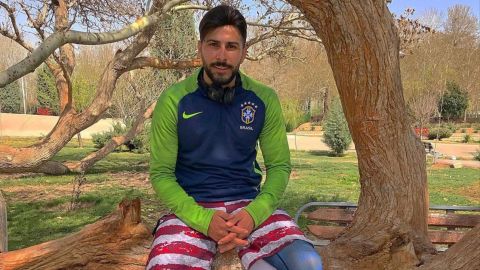
Shahid Alikhani square is a nondescript part of the historic Iranian city of Isfahan. Its sole claim to prominence is the grand entrance to one of the city’s main metro stations.
But now it has become a place of pilgrimage for supporters of the high-profile Iranian footballer Amir Nasr-Azadani who fear the young man could be executed in the square, where an execution platform has been installed, a witness close to Nasr-Azadani in Iran told CNN.
Terrified Iranian families believe that while the Western world is preoccupied with Christmas celebrations, a wave of executions in the country is imminent following the recent protests that have swept the country following the death in September of Mahsa Amini, a young woman detained by Iran’s notorious morality police for being accused of improperly wearing her hijab.
In collaboration with the activist group 1500Tasvir, CNN has verified documents, video, witness testimony and statements from inside the country which suggest that at least 43 people, including Nasr-Azadani, could face imminent execution.
Authorities have already executed at least two people in connection with protests in Iran last month, one of whom was hanged publicly.
Witness testimonies and official documents, reviewed by CNN and 1500Tasvir, provide evidence that suggests a rushed judicial process in Iran; charges which could carry the death sentence, often handed down in a single sitting.
Nasr-Azadani is accused of involvement in the killing of three security officers, including two volunteer Basij militia members, during protests in Isfahan on November 16, Iranian state media IRNA reported last week.
According to state media, the city’s chief justice, Asadullah Jafari, said Nasr-Azadani had been charged with Baghi – or rioting against authorities. Under Iran’s penal code, the sentence carries the death penalty.
According to state media, the city’s chief justice, Asadullah Jafari, said Nasr-Azadani had been charged with Baghi – or rioting against authorities. Under Iran’s penal code, the sentence carries the death penalty.
Since then, a witness to his arrest said they hoped Nasr-Azadani would be freed, but nevertheless visited Shahid Alikhani square daily to see if authorities would show up with the footballer and execute him on the scaffold. “From the day he was arrested, authorities told us he would be released by the end of the week,” the witness tells CNN.
Then the information dried up. Weeks later the witness, who is close to Nasr-Azadani, says authorities told them that the 26-year-old could be hanged at Shahid Alikhani square.
“The thought that they could execute him any day is really very hard for us … and the daily news we keep hearing is worrisome.”
Nasr-Azadani’s family was initially unaware of the reason for his arrest, the witness tells CNN, and officials would not share information of his condition. Those close to him were also warned to “keep quiet” about his case if they wanted to see him released sooner, the witness tells CNN.
The court last week said it obtained “video and sufficient documentation that prove he [Nasr-Azadani] is part of an armed group” and that the footballer had confessed to his crimes, state media IRNA reported.
‘I really fear they will execute Majid’
Previous CNN investigations have found prisoners have been subjected to torture and sexual assault. Human rights groups say torture-tainted “confessions” have been used against the defendants in sham trials.
Iranian officials have defended the trials nevertheless. In recent days, one Iranian MP said he believes that those involved in the current unrest must be executed within 5 to 10 days after their arrest. CNN received no official response from Iranian officials to its request for comment.
Another man, Majid Kazemi, was also accused of involvement in the killing of three security forces in Isfahan, the document obtained by CNN and 1500Tasvir shows. Kazemi told others he was coerced into confessing his involvement in criminal acts during his interrogation.
“He did not confess to having done any of the things he was charged with, and so they beat him up severely,” a source close to Kazemi tells CNN.
A released prisoner from the facility where Majid is being kept told the source his arm, leg and nose were broken.
Majid’s court session is set to take place during the holiday season, the source tells CNN.
“This will coincide with a time in which the international community is observing these holy days, and the Islamic Republic regime will take advantage of being removed from the watchful eyes of the world.
“I really fear they will execute Majid.”
In a recording from inside a Tehran prison, inmate Sahand Noor Mahammadzade speaks about how he was coerced into confession.




